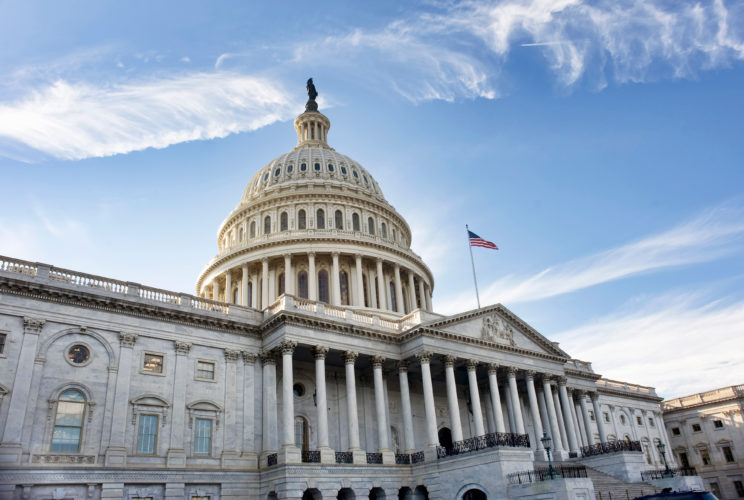The $2 trillion plan to prop up the US economy is expected to pass the House of Representatives on March 27. It’s intended to respond to the coronavirus pandemic and provide direct payments and jobless benefits for individuals, money for states and a huge bailout fund for businesses. Olin experts weigh in on whether it is sufficient as the economy reels.
Other economic steps ‘would be better’
“While much of the country—including President Trump—is looking forward to when this coronavirus crisis will end, I think it is important for everyone to realize that the coronavirus crisis has not really begun yet in the United States.

“The $2T package is likely to be a first step, especially since the federal government does not seem willing to implement the type of nationwide shelter in place order that would be needed for us to quickly contain the outbreak. The longer this goes on, the harder it will be for companies to keep employing its workforce, and the more lost economic value there will be.
Are we able to keep spending this type of money every two to three months? I am unsure about that.
Raphael Thomadsen
“I also hope that it is well run. If the money does not get spent right, we may end up losing the jobs we are trying to save.
“I would propose some other economic steps that I think would be better. I would suspend rent, mortgage and loan payments through the national emergency. (By suspending them, I wouldn’t change the amount of money paid back, but effectively the national emergency would become a time when loans and housing assets would temporarily earn a zero rate of return.) This has been done in parts of Europe, so it is a doable thing to do.
“I do think actions giving households in need cash is valuable, although people probably need less cash if they do not have to pay their rent or loans, allowing us to stretch out the federal spending to get more bang for their buck. We would also have to help make sure that businesses do not go out of business, but by taking away rent and borrowing costs, that should help a lot of businesses get through their time being shuttered.”
Raphael Thomadsen, associate professor of marketing
‘Ridiculous for this to be a stimulus bill’
“China’s economy is slated to slow from 6.1% growth to 2.4% growth, rather than contract, so the estimate of a 24% contraction in the economy seems extreme—unless we don’t take containment seriously. If we can contain it, $2 trillion seems excessive—it’s 10% of GDP, and greater than revenue from income tax last year. Having said that, if we are asking businesses to close, then we need to compensate them and their employees for the closure.

“But we should behave like venture capitalists and authorize money weekly or bi-weekly, rather than committing to a package for a program whose duration and severity is completely unknown — but forecastable if we behave like China and South Korea.
“It is ridiculous for this to be a stimulus bill.
“You can’t stimulate an economy when there is no way for people to spend money.
Anne Marie Knott
“As Phil Dybvig [Boatmen’s Bancshares Professor of Banking and Finance] says, this is a recipe for inflation. Accordingly, we shouldn’t be writing checks to everyone, we should only be writing checks to people who are furloughed due to business closures.”
Anne Marie Knott, Robert and Barbara Frick Professor of Business, Olin Business School
Will people spend or save?

“Consumers with stable jobs will likely treat the direct payments from this bill somewhat similarly to how they treat tax refunds. Consumers frequently spend a chunk of tax refunds, but notably, they actually save a higher percentage of their tax refunds than they do of their standard income. In this time of uncertainty, these consumers are likely to save an even greater chunk of the direct payments from this bill than they do of typical tax refunds.
“But of course, consumers without stable employment will use these direct payments as a financial lifeline. They will likely need to spend the funds to cover the costs of necessities.”
Cynthia Cryder
Cynthia Cryder, associate professor of marketing
‘Attack the problem’

There is no net stimulus, although there is a transfer of resources from taxpayers to those who receive the checks. The same applies to business bailouts, low-interest loans, etc. It’s a fact the we have a problem at the moment, and many of us are going to feel the effects of that, whether it be directly through being ill, or less directly by having to work less or differently. Checks from the government will help some of those who feel those effects, but at the expense of others. There is no overall economic benefit, although there might be political advantages.
“The only way for the government to stimulate the economy is by doing something that creates new economic value, or reduces wasted value, not just rearranging the value we already have.
Glenn MacDonald
“This is why the government’s attention should be solely directed towards funding serious attempts to develop vaccines, streamlining approval processes, developing ways to protect health care workers, expanding short term hospital capacity, … That is, attack the problem instead of engaging in pointless and ineffective attempts to ‘do something.'”
Glenn MacDonald, John M. Olin Distinguished Professor of Economics and Strategy
As long as the health crisis is ongoing

“I don’t think any amount of stimulus payment will make households spend more as long as the health crisis is ongoing. The same goes for business investment.
“On the other hand, the stimulus payments to households will enable them to not fall behind on payment of fixed obligations and hence aid in quick recovery once the health crisis passes. The extension of unemployment benefits will achieve the same objective.
“As far as the payment to business goes, while the stimulus is unlikely to encourage business investment, it will avoid business failure and bankruptcy.
Radhakrishnan Gopalan
“As far as layoffs go, I am not sure if the stimulus has some special provision encouraging firms to avoid or minimize layoffs. Based on the experience in Germany during the great recession, the most effective provision is for the government to subsidize some part of employee wages. Stipulating conditions to business aid such as no layoffs may not work as that will only make firms reluctant to avail of government aid.”
Radhakrishnan Gopalan, professor of finance and academic director of the IIT-Bombay-Washington University Executive MBA Program
Pandemic Unemployment Insurance

“The most interesting part of this bill for me is that it offers 26 weeks of unemployment payments to self-employed workers and contract workers (e.g., Uber drivers), through a new program called Pandemic Unemployment Insurance.
“Previously, unemployment payments were only available to workers who received wages that are reported on a W-2. It is not entirely clear yet how the government will determine which self-employed workers and contract workers are eligible for these payments.
“I am very interested to see if unemployment assistance for self-employed workers and contract workers becomes a permanent feature of our social safety net.
Seth Carnahan
“There has been a growing discussion about how the emerging class of gig economy workers, like Uber drivers, should be viewed from a legal perspective. Are they employees? Contractors?
“Uber has previously fought hard to keep their drivers classified as contractors, as this allows Uber to avoid paying certain benefits. But Uber lobbied hard for this new Pandemic Unemployment Assistance program for their drivers.
“Now that the government is using public funds to support Uber drivers (and hence making it more attractive to be an Uber driver now and in the future), it seems reasonable to predict that the government might ask Uber to, in turn, do more for its drivers. Especially if unemployment insurance for gig workers becomes a permanent feature of our social safety net.”
Seth Carnahan, associate professor of strategy
Big business relief ‘does not go far enough’
“The $75 billion industry-specific loans included in the stimulus package is welcome news for the intended industries: hotels, restaurants and airlines, as is the $17 billion for Boeing and defense-related companies. The loans will allow companies in those industries to meet their short-term obligations and cash flow needs, and prevent them from aggressively cutting capacity and laying off employees.
“Not only will it help the industries through the next few months of nearly stopped economy, it might also help ramp up resources in the early part of the recovery when the virus spread slows and people return to work. Companies in these industries will need working capital to bring up their capacity to support normal demand.

“However, I worry that the package does not go far enough to drive a fast recovery. While the stimulus package seems to reflect, always on the lower side, estimated impact in any one of the intended-to-protect sectors, it fails to understand the disaster propagation across sectors and the corporate-inertia behavior in slowing down or ramping up in the face of unprecedented uncertainty. When demand for airline services suddenly dropped 60% to 80%, the airlines were not able to immediately adjust capacity (i.e., number of flights). They are still carrying more aircraft contracts, employees and other supporting contract services than what will be needed to meet the projected demand for the next six to nine months, or even a year.
“Inertia in decisions is common in situations that are hard to forecast and requires high working capital needs not supported by revenue streams. This is where the stimulus plan loans will be most helpful.
Panos Kouvelis
“As airlines exhibit inertia in adjusting down capacity, they will exhibit similar inertia in slowly adjusting their capacity up. Their future planning will always be more pessimistic in their plans for planes and other supporting supply chain services.
“This will affect all suppliers to the airline industry but in particular our major plane manufacturer, Boeing. It will be affected not only in terms of delayed or canceled plane purchases this year, but less aggressive plane purchases in the next four to five years. Future corporate resilience on the part of the airlines will require not forgetting the ‘black swan’ event you experienced vividly.
“Finally, Boeing’s market value has already been hit hard by the pandemic crisis. On the commercial plane side, 737 MAX orders are already in question, and there will be canceled orders and fewer future orders by a hammered airline industry.
“The defense side will inevitably be hit, too, as the government puts its emergency resources into public health, health care management, fighting market stagnation and unemployment, and might be less inclined to accelerate defense programs or purchases of the current weapon systems.
“In a serious interconnected supplier system in the aerospace and defense industries, the pandemic disaster has just started and its magnitude might not be fully accounted in this cash flow maintenance and short-term continuity risk management package.”
Panos Kouvelis, director of the Boeing Center for Supply Chain Innovation, Olin Business School
WashU Senior News Director Sara Savat contributed to this report.




Apparently Mr. Thomadsen is proposing suspension of rent during the period, and in return, giving the landlord relief from the debt payments on the property. Apparently he believes that a landlord has only one expense, debt payment. Sadly, landlord have many other expenses they pay to support property. Debt service is typically less than one half of the cost of operating rental property. He also needs to think through who he is proposing to short change in the end. The mortgage interest flows through to savers at saving and loans, banks, and other lending other institutions that collect the interest from the borrower and send it to their depositors and investors. These are ordinary people who depend on the income from their invested savings. Are they less worthy than the tenants. Mr Thomadsen needs to think it through a little further.
What a fantastic collection of interesting, thought-provoking insights from the best-of-the-best faculty!
Hmm